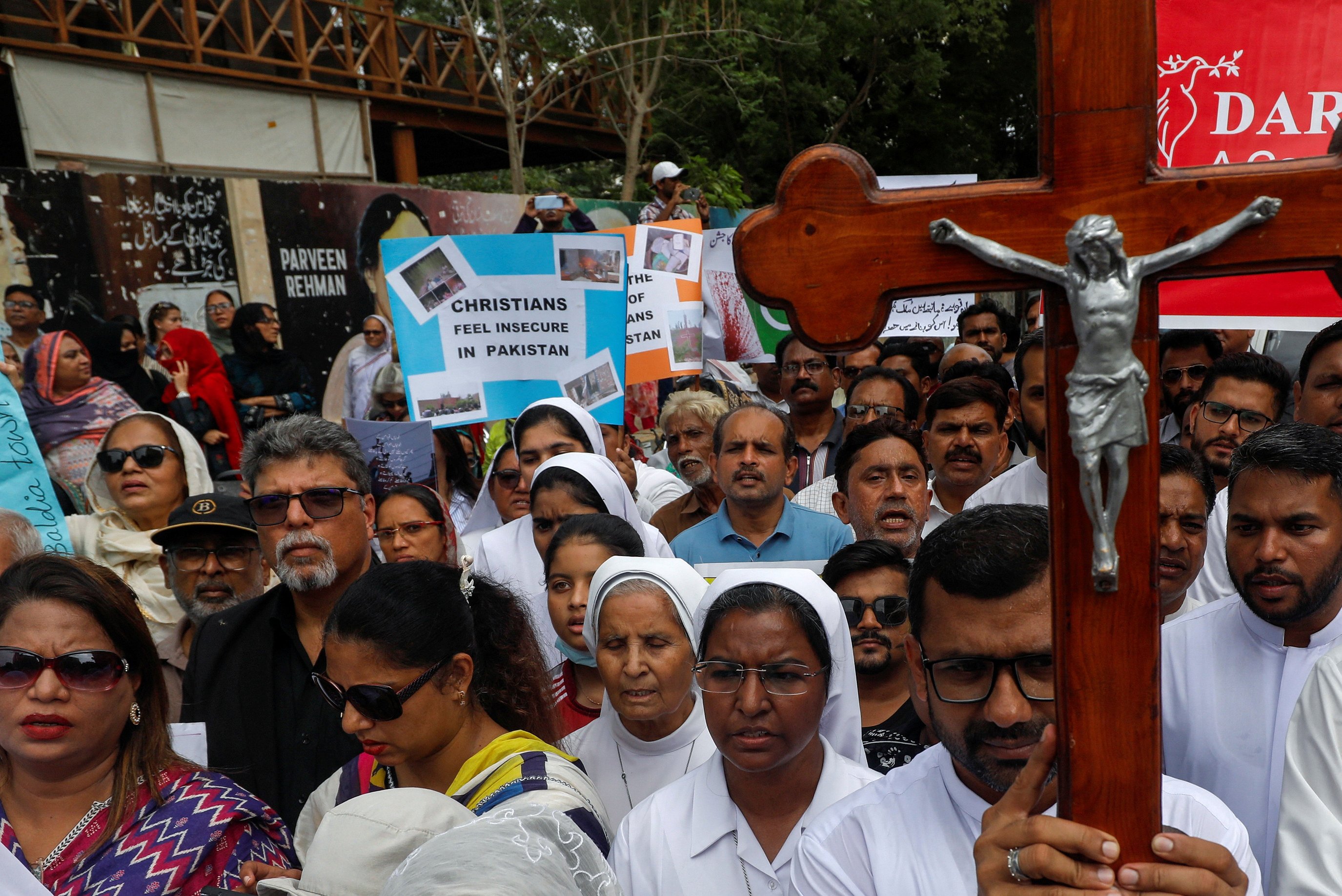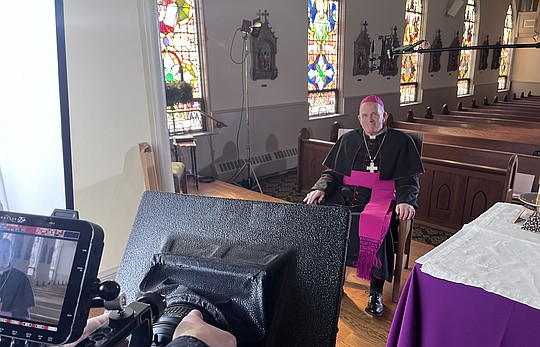Pakistani Catholics in U.S. call for awareness, action after churches destroyed
August 24, 2023 at 12:14 p.m.

PHILADELPHIA OSV News – Pakistani Catholics in the U.S. are calling for international advocacy and action following a devastating Aug. 16 attack on several Christian churches in Pakistan's eastern city of Jaranwala.
At least six churches, including St. Paul Catholic Church and the historic Salvation Army church, were set ablaze by armed Muslim mobs numbering as high as 7,000. Bibles and other religious items were destroyed, and hundreds of private homes belonging to Christians were looted, with attackers piling families' belongings outside and setting fire to them.
"We want our political leaders to raise their voice against this violence and these injustices to minorities," Father Tariq Isaac, chaplain of the Archdiocese of Philadelphia's Pakistani Catholic community, told OSV News. "Our government here (in the U.S.) approves help to Pakistan, but never forces it to implement laws protecting minorities – to protect human rights, justice and peace in the community."
The violence in Jaranwala followed accusations that two Christians, Raja Umar and Rocky Masih, had violated Pakistan's blasphemy laws by desecrating the Quran, Islam's holiest text.
First introduced under British colonial rule, the blasphemy laws were substantially expanded in the 1980s to specifically protect Islam – the majority religion in Pakistan – from a wide range of direct and indirect affronts.
Umar and Masih have been arrested and are under investigation for charges that are punishable by death.
More than 100 rioters have also been arrested, having been identified in social media videos of the attacks. Some eyewitnesses accused police of failing to intervene during the attacks.
According to BBC News Urdu, torn pages from the Quran were found near the Christian neighborhood with allegedly blasphemous content written on them. Mobs formed after reports circulated on social media and throughout the city.
For Father Isaac, the allegations against Umar and Masih were all too familiar.
In 2011, his own brother and several other Christians were arrested for blasphemy in the family's hometown of Gujranwala, near Lahore. Burned and vandalized copies of the Quran had been placed in front of their houses by local Islamic and political leaders, who then charged and imprisoned the minority group.
Upon their release, most fled Pakistan immediately, with Father Isaac – who had served as a priest in Pakistan for 18 years – following his brother to the U.S. and eventually becoming a naturalized U.S. citizen. A third brother, who also faced blasphemy accusations, currently lives in Malaysia but hopes to move to Canada. Father Isaac's parents arrived in the U.S. in May 2018; his two sisters remain in Pakistan.
Most of the archdiocese's Pakistani Catholics and Christians have similar stories to tell, said Father Isaac, now in residence at St. William Parish in Philadelphia, where some 60 Pakistani Catholics and Christians gathered Aug. 19 for an ecumenical prayer service following the attacks.
Shammas Shamaun, a social worker from Sahiwal who is now based in Philadelphia, told OSV News that "the law in Pakistan does not protect" minorities such as Christians, who represent less than 1.3% of the overall population.
"It's written in the constitution of Pakistan that every citizen has equal rights, but we don't find equal rights over there," said Shamaun, noting that the blasphemy laws work only "to destroy the Christians, to pressure them ... because we are a minority."
The blasphemy laws are regularly invoked to ensure forced conversions to Islam, said Shamaun, adding he had faced threats of blasphemy accusations as he worked to secure the release of kidnapped Christian girls in Pakistan.
Father Boniface "Bonnie" Mendes, a retired priest living in Faisalabad, Pakistan, told OSV News there is "systemic" and "very strong prejudice" against Christians in Pakistan.
Attacks on Christian churches in Pakistan are "a continual process, and not something new," said Father Mendes, who was on hand at the Aug. 19 ecumenical prayer service while visiting family in the U.S.
Daily life for Christians in Pakistan is "very, very uncertain, and very frightening sometimes," he said.
Attempts at interfaith dialogue typically falter, he said.
"There is dialogue, but they come mainly to try to convert us," said Father Mendes. "It is not that spirit of dialogue that you know of (in the U.S.). They come to convert us, so they preach Islam to us when they come, rather than sit down and talk about ... what do your books teach, what do our books say, how do we promote love, how do we promote something common. ... They just want to dominate."
"We have a lot of stories about religion with the face of discrimination," said Shamaun. "I know life is busy here (in the U.S.), but still I request people to hear us, and give us a chance to speak out."
Pakistani Catholics in the U.S. are "very saddened and feel very bad" about the plight of fellow believers back in Pakistan, said Father Isaac.
"We pray that the good Lord will help our people to have peace, especially peace globally, and that they can remain strong in their faith," he said.
Gina Christian is a national reporter for OSV News. Follow her on X (formerly Twitter) at @GinaJesseReina.
Related Stories
Tuesday, December 23, 2025
E-Editions
Events
PHILADELPHIA OSV News – Pakistani Catholics in the U.S. are calling for international advocacy and action following a devastating Aug. 16 attack on several Christian churches in Pakistan's eastern city of Jaranwala.
At least six churches, including St. Paul Catholic Church and the historic Salvation Army church, were set ablaze by armed Muslim mobs numbering as high as 7,000. Bibles and other religious items were destroyed, and hundreds of private homes belonging to Christians were looted, with attackers piling families' belongings outside and setting fire to them.
"We want our political leaders to raise their voice against this violence and these injustices to minorities," Father Tariq Isaac, chaplain of the Archdiocese of Philadelphia's Pakistani Catholic community, told OSV News. "Our government here (in the U.S.) approves help to Pakistan, but never forces it to implement laws protecting minorities – to protect human rights, justice and peace in the community."
The violence in Jaranwala followed accusations that two Christians, Raja Umar and Rocky Masih, had violated Pakistan's blasphemy laws by desecrating the Quran, Islam's holiest text.
First introduced under British colonial rule, the blasphemy laws were substantially expanded in the 1980s to specifically protect Islam – the majority religion in Pakistan – from a wide range of direct and indirect affronts.
Umar and Masih have been arrested and are under investigation for charges that are punishable by death.
More than 100 rioters have also been arrested, having been identified in social media videos of the attacks. Some eyewitnesses accused police of failing to intervene during the attacks.
According to BBC News Urdu, torn pages from the Quran were found near the Christian neighborhood with allegedly blasphemous content written on them. Mobs formed after reports circulated on social media and throughout the city.
For Father Isaac, the allegations against Umar and Masih were all too familiar.
In 2011, his own brother and several other Christians were arrested for blasphemy in the family's hometown of Gujranwala, near Lahore. Burned and vandalized copies of the Quran had been placed in front of their houses by local Islamic and political leaders, who then charged and imprisoned the minority group.
Upon their release, most fled Pakistan immediately, with Father Isaac – who had served as a priest in Pakistan for 18 years – following his brother to the U.S. and eventually becoming a naturalized U.S. citizen. A third brother, who also faced blasphemy accusations, currently lives in Malaysia but hopes to move to Canada. Father Isaac's parents arrived in the U.S. in May 2018; his two sisters remain in Pakistan.
Most of the archdiocese's Pakistani Catholics and Christians have similar stories to tell, said Father Isaac, now in residence at St. William Parish in Philadelphia, where some 60 Pakistani Catholics and Christians gathered Aug. 19 for an ecumenical prayer service following the attacks.
Shammas Shamaun, a social worker from Sahiwal who is now based in Philadelphia, told OSV News that "the law in Pakistan does not protect" minorities such as Christians, who represent less than 1.3% of the overall population.
"It's written in the constitution of Pakistan that every citizen has equal rights, but we don't find equal rights over there," said Shamaun, noting that the blasphemy laws work only "to destroy the Christians, to pressure them ... because we are a minority."
The blasphemy laws are regularly invoked to ensure forced conversions to Islam, said Shamaun, adding he had faced threats of blasphemy accusations as he worked to secure the release of kidnapped Christian girls in Pakistan.
Father Boniface "Bonnie" Mendes, a retired priest living in Faisalabad, Pakistan, told OSV News there is "systemic" and "very strong prejudice" against Christians in Pakistan.
Attacks on Christian churches in Pakistan are "a continual process, and not something new," said Father Mendes, who was on hand at the Aug. 19 ecumenical prayer service while visiting family in the U.S.
Daily life for Christians in Pakistan is "very, very uncertain, and very frightening sometimes," he said.
Attempts at interfaith dialogue typically falter, he said.
"There is dialogue, but they come mainly to try to convert us," said Father Mendes. "It is not that spirit of dialogue that you know of (in the U.S.). They come to convert us, so they preach Islam to us when they come, rather than sit down and talk about ... what do your books teach, what do our books say, how do we promote love, how do we promote something common. ... They just want to dominate."
"We have a lot of stories about religion with the face of discrimination," said Shamaun. "I know life is busy here (in the U.S.), but still I request people to hear us, and give us a chance to speak out."
Pakistani Catholics in the U.S. are "very saddened and feel very bad" about the plight of fellow believers back in Pakistan, said Father Isaac.
"We pray that the good Lord will help our people to have peace, especially peace globally, and that they can remain strong in their faith," he said.
Gina Christian is a national reporter for OSV News. Follow her on X (formerly Twitter) at @GinaJesseReina.










